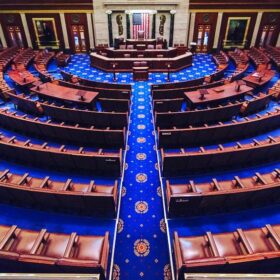An initial group of 40 hydrogen ecosystem partners have signed a multi-state agreement to become one of at least four regional clean energy hydrogen hubs designated through the federal Regional Clean Hydrogen Hubs program included in the Bipartisan Infrastructure Investment and Jobs Act.
Governor Kathy Hochul announced that New York is leading the consortium, which includes states along the I-95 corridor, a critical step in implementing the New York governor’s directive in her 2022 State of the State address to make New York State a green hydrogen hub. The announcement also supports New York’s Climate Leadership and Community Protection Act goal to reduce greenhouse gas emissions 85% by 2050. Today’s announcement is
“New York is proud to lead the way in forming bold partnerships to combat the existential threat of climate change,” Governor Hochul said. “Expanding the hydrogen market is critical to New York’s aggressive pursuit of clean-energy alternatives that will supercharge our economy and advance our climate goals.”
Consortium partners have committed to collaborate with NYSERDA, NYPA, and ESD on proposal development to advance hydrogen projects. They will also coordinate with their respective state entities to help align the consortium’s efforts with each state’s climate and clean energy goals. These include Connecticut’s Global Warming Solutions Act goal of reducing greenhouse gas emissions 80% by 2050, Massachusetts’ goal to be carbon neutral by 2050 and New Jersey’s Global Warming Response Act goal of reducing greenhouse gas emissions 80% by 2050.
The Department of Energy has $8 billion of funding available, expected to launch in May 2022, and the consortium plans to develop a proposal in response.
“With our partners, New York State is positioning the region as a leader in the development of green hydrogen with a vision for how to provide a significant part of the national hydrogen infrastructure network while delivering benefits to vulnerable and disadvantaged communities by displacing local fossil fuel generation and creating clean energy job opportunities,” said NYSERDA President and CEO Doreen M. Harris.
In addition to the states of New York, Connecticut, Massachusetts, and New Jersey, the partners include:
- Alliance Energy Group LLC
- Alternative Aviation Fuels LLC
- BAE Systems
- Bloom Energy Corporation
- CALSTART
- Climate Jobs NY
- Columbia University
- Consolidated Edison Company of New York, Inc.
- Cornell University
- Cummins, Inc.
- Daroga Power
- Doosan Fuel Cell America, Inc.
- Ecolectro, Inc.
- Empire State Development (ESD)
- FuelCell Energy
- Invenergy Hydrogen LLC
- Liberty Utilities (St. Lawrence Gas) Corp.
- Long Island Power Authority (LIPA)
- National Grid
- National Offshore Wind Research and Development Consortium
- New York Battery and Energy Storage Technology (NY-BEST)
- New York Power Authority (NYPA)
- New York University
- Next Hydrogen Corporation
- Nucor Steel Auburn, Inc.
- Ohmium International
- Orange and Rockland Utilities, Inc.
- Partnership Fund for New York City
- Plug Power Inc.
- Rochester Institute of Technology (RIT)
- Standard Hydrogen Corporation
- Stony Brook University / Advanced Energy Center (AERTC)
- The City College of New York (CUNY)
- The Port Authority of New York and New Jersey
- University at Buffalo, The State University of New York
- Vermont Gas Systems (VGS)
- WATT Fuel Cell Corporation
With the execution of these agreements, the partners will work together to:
- Define the shared vision and plans for the regional hydrogen hub that can advance safe green hydrogen energy innovation and investment to address climate change, while improving the health, resiliency, and economic development of the region’s residents.
- Advance a Hub proposal that makes climate and environmental justice central to its strategy, which will deliver opportunities and improved quality of life to under resourced areas across the region.
- Perform research and analysis necessary to support the hub proposal and align on approach to quantifying greenhouse gas emissions reductions as a result of deploying this technology.
- Develop a framework to ensure the ecosystem for innovation, production, infrastructure, and related workforce development is shared across all partner states.
- Support environmentally responsible opportunities to develop hydrogen, in accordance with participating states’ policies.
One of the business partners is Next Hydrogen Corporation, a wholly owned subsidiary of Next Hydrogen Solutions, an Ontario-based designer and manufacturer of hydrogen electrolyzers.
“We are joining an impressive group of industry leaders to evaluate and develop this hydrogen hub proposal with the shared goal of facilitating the development of resilient clean energy infrastructure in the United States,” said Raveel Afzaal, President and CEO of Next Hydrogen.
The consortium continues to seek additional public and private partners in the region and focus on coordinating the regional fuel cell innovation ecosystem. The coalition will seek to integrate offshore wind and solar PV into hydrogen production and deploy hydrogen for use in transportation, including for medium and heavy- duty vehicles, heavy industry, power generation and maritime applications or other appropriate uses consistent with decarbonization efforts.
Future consortium partners may include utilities, electrolyzer suppliers, fuel cell solution providers, transportation, fueling infrastructure and industrial partners, government agencies, community organizations, institutes of higher education, community colleges, vocational schools and non-profit organizations.
This content is protected by copyright and may not be reused. If you want to cooperate with us and would like to reuse some of our content, please contact: editors@pv-magazine.com.









By submitting this form you agree to pv magazine using your data for the purposes of publishing your comment.
Your personal data will only be disclosed or otherwise transmitted to third parties for the purposes of spam filtering or if this is necessary for technical maintenance of the website. Any other transfer to third parties will not take place unless this is justified on the basis of applicable data protection regulations or if pv magazine is legally obliged to do so.
You may revoke this consent at any time with effect for the future, in which case your personal data will be deleted immediately. Otherwise, your data will be deleted if pv magazine has processed your request or the purpose of data storage is fulfilled.
Further information on data privacy can be found in our Data Protection Policy.